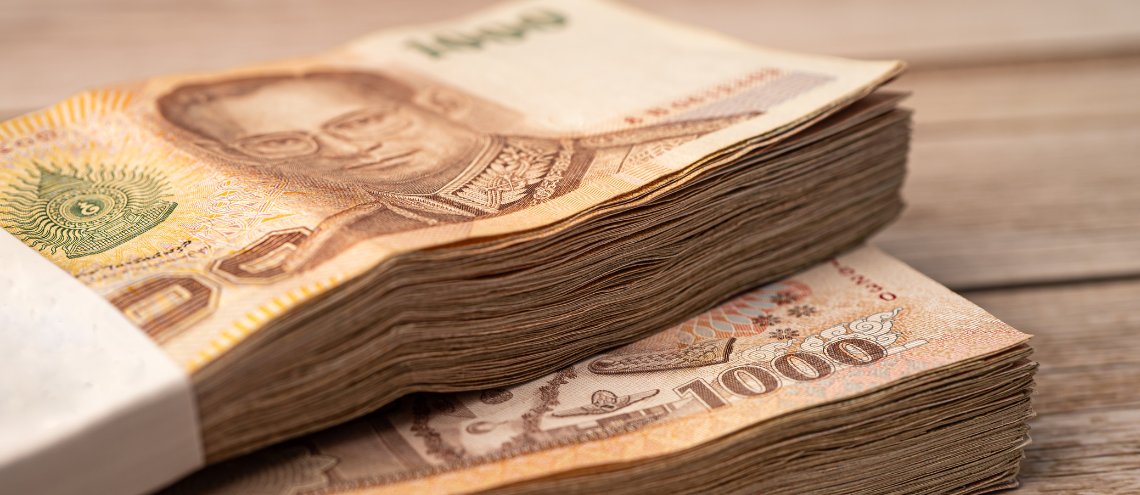Thailand to Roll Out Controversial $13.8 Billion Digital Money Handout to Citizens
Thailand’s prime minister, Mr. Srettha Thavisin, stated on Monday that starting August, eligible businesses and individuals can register for digital cash handouts. This controversial program costing billions of dollars aims to boost Thailand’s lagging economy.
In this Pacific Prime Thailand article, we will discuss the controversial billion-dollar digital money handout program from the Thai government.
Overview: The Digital Wallet Program in Thailand

The Digital Wallet program was a large campaign from the Pheu Thai party ahead of last year’s general election. According to the government, this scheme will cause an “economic tornado” and the stimulus and subsequent consumption are expected to boost gross domestic product growth by 1.2-1.6%.
Back in April, the government announced that the Digital Wallet program intended to hand out 10,000 baht (approximately USD $275) to 50 million citizens in digital money for spending at local businesses.
Starting Date
Thailand’s prime minister, Mr. Srettha Thavisin, announced on X that registrations will begin on the first of August and also provided instructions to ensure the program’s smooth implementation.
The prime minister also revealed that agencies concerned were also told to introduce measures in hopes of addressing any irregularities and thoroughly reviewing eligibility should the scheme’s conditions ever get breached.
While the implementation of the scheme will take some time, the prime minister wrote the people “will not be stood up”.
Registration
Following the Digital Wallet subcommittee meeting on Friday the 5th of July, Deputy Finance Minister Julapun Amornvivat stated the meeting focused on the registration process for people without smartphones and alternatives for this group.
For instance, people with basic phones can register using a one-time password while people without cell phones can register using their national ID.
Money Criteria
Recipients can spend the money, within their districts listed on their ID card, on goods from small shops registered under the program. Alcohol, cigarettes, fuel, and online purchases are prohibited.
Criticisms
Despite the goals of the Digital Wallet program, several economists have criticized the program by calling it an ineffective way to contribute to sustainable economic growth in comparison to other measures.
The Thai opposition also complained this week that the Digital Wallet scheme lacks clarity, with lawmakers saying that the Ministry of Finance constantly changed the conditions and criteria for the cash handout scheme, including the list of items its beneficiaries would be allowed to purchase.
In defense of the scheme, the prime minister argued that minor changes are expected and the scheme will boost the economy amid business and factory closures.
According to an analysis published by the Yusof Ishak Institute (ISEAS) in Singapore, another serious issue the Digital Wallet scheme could face is Thailand’s digital divide.
While the scheme will attempt to reach 76% of the country’s population, many potential beneficiaries may not be able to access the digital wallet due to lack of internet connection or smartphone access.
There were also criticisms surrounding the legality of the government’s borrowing options and their compliance with existing financial regulations. Some experts have also expressed apprehension about potential risks of excessive borrowing and its impact on the country’s financial stability.
Thailand’s Economic Downturn

In recent years, Thailand suffered from a sluggish economy that deteriorated without any clear sign of growth. This month, the World Bank’s Thailand Economic monitor projected a GDP growth of only 2.4% for 2024.
Delayed Implementation
The Digital Wallet program’s financing also faced numerous hurdles, which delayed its planned implementation. Initially, the government said that the state Bank for Agriculture and Agricultural Cooperatives (BAAC) would cover some of the required funding.
However, after warnings from financial experts, it was later announced that the project’s funding would come out of the 2024 and 2025 fiscal budgets.
At a news conference on Monday, July 15th, Deputy Minister of Finance Julapan Amornvivat stated that the scheme’s estimated cost lowered from 500 billion baht (USD $13.8 billion) to 450 billion baht (USD $12.4 billion), making the finding possible.
This assured that all the estimated 50 million people will still be part of the program as only 90% of those eligible used them in prior handouts. Additionally, the Digital Wallet committee also agreed to exclude shop owners and cash recipients with fraud history in past programs.
Plan Limitations
In the way of limitations, the scheme excluded certain undecided goods, to which earlier proposals suggested oils, services, and online purchases should be among the transaction exclusions.
According to Amornvivat, the Commerce Ministry will announce the exclusions next week once the detailed plan is submitted to the Cabinet.
Conclusion
The Digital Wallet scheme, courtesy of the prime minister Srettha Thavisin, aims to boost the country’s lagging economy, there were also criticisms surrounding various aspects such as equal accessibility and the government’s questionable compliance with borrowing from the BAAC.
While the Digital Wallet program may still take some time to execute, you can still craft your own safety net with a health insurance plan. Having the right insurance plan can help reduce medical costs and alleviate financial stress in case of illnesses or injuries, and that is where we come in.
As an experienced international health insurance broker, Pacific Prime Thailand has helped both local citizens and expats find a health insurance plan that matches both their budget range and unique healthcare needs.
Whether you’re an expat in Thailand or a local Thai citizen yourself looking for healthcare in the land of smiles, our team of specialists will be more than happy to help you out. If you have any further questions, get in touch with us or get a free quote here.
- PrEP in Thailand: Cost and Where to Buy It - March 17, 2025
- New Cash-On Delivery Law Allows Buyers to Inspect Packages - October 9, 2024
- Are You at Risk of Parkinson’s Disease? - October 7, 2024





Comments
Comments for this post are closed.
We'll notify you
when our team replies!